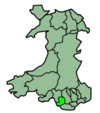Pyle railway station
| Pyle | |
|---|---|
| Welsh: Y Pîl | |
 | |
| Location | |
| Place | Pyle |
| Local authority | Bridgend |
| Grid reference | SS823820 |
| Operations | |
| Station code | PYL |
| Managed by | Arriva Trains Wales |
| Number of platforms | 2 |
| DfT category | F2 |
|
Live arrivals/departures, station information and onward connections from National Rail Enquiries | |
| Annual rail passenger usage* | |
| 2004/05 | 48,056 |
| 2005/06 |
|
| 2006/07 |
|
| 2007/08 |
|
| 2008/09 |
|
| 2009/10 |
|
| 2010/11 |
|
| 2011/12 |
|
| 2012/13 |
|
| 2013/14 |
|
| 2014/15 |
|
| National Rail – UK railway stations | |
| * Annual estimated passenger usage based on sales of tickets in stated financial year(s) which end or originate at Pyle from Office of Rail and Road statistics. Methodology may vary year on year. | |
|
| |
| Llynvi and Ogmore Railway | ||||||||||||||||||||||||||||||||||||||||||||||||||||||||||||||||||||||||||||||||||||||||||||||||||||||||||||||||||||||||||||||||||||||||||||||||||||||||||||||||||||||||||||||||||||||||||||||||||||||||||||||||||||||||||||||||||||||||||||||||||||||||||||||||||||||||||||||||||||||||||||||||||||||||||
|---|---|---|---|---|---|---|---|---|---|---|---|---|---|---|---|---|---|---|---|---|---|---|---|---|---|---|---|---|---|---|---|---|---|---|---|---|---|---|---|---|---|---|---|---|---|---|---|---|---|---|---|---|---|---|---|---|---|---|---|---|---|---|---|---|---|---|---|---|---|---|---|---|---|---|---|---|---|---|---|---|---|---|---|---|---|---|---|---|---|---|---|---|---|---|---|---|---|---|---|---|---|---|---|---|---|---|---|---|---|---|---|---|---|---|---|---|---|---|---|---|---|---|---|---|---|---|---|---|---|---|---|---|---|---|---|---|---|---|---|---|---|---|---|---|---|---|---|---|---|---|---|---|---|---|---|---|---|---|---|---|---|---|---|---|---|---|---|---|---|---|---|---|---|---|---|---|---|---|---|---|---|---|---|---|---|---|---|---|---|---|---|---|---|---|---|---|---|---|---|---|---|---|---|---|---|---|---|---|---|---|---|---|---|---|---|---|---|---|---|---|---|---|---|---|---|---|---|---|---|---|---|---|---|---|---|---|---|---|---|---|---|---|---|---|---|---|---|---|---|---|---|---|---|---|---|---|---|---|---|---|---|---|---|---|---|---|---|---|---|---|---|---|---|---|---|---|---|---|---|---|---|---|---|---|---|---|---|---|---|---|---|---|---|---|---|---|---|---|
Legend | ||||||||||||||||||||||||||||||||||||||||||||||||||||||||||||||||||||||||||||||||||||||||||||||||||||||||||||||||||||||||||||||||||||||||||||||||||||||||||||||||||||||||||||||||||||||||||||||||||||||||||||||||||||||||||||||||||||||||||||||||||||||||||||||||||||||||||||||||||||||||||||||||||||||||||
| ||||||||||||||||||||||||||||||||||||||||||||||||||||||||||||||||||||||||||||||||||||||||||||||||||||||||||||||||||||||||||||||||||||||||||||||||||||||||||||||||||||||||||||||||||||||||||||||||||||||||||||||||||||||||||||||||||||||||||||||||||||||||||||||||||||||||||||||||||||||||||||||||||||||||||
Pyle railway station is a minor station in Pyle (Welsh: Y Pîl) in Bridgend county borough, South Wales. The station is located at street level at Beach Road in Pyle. It is a stop on the South Wales Main Line, served by the Arriva Trains Wales Swanline Swansea to Cardiff Central regional trains. These services are generally every 2 hours during the day (including Sundays), with additional trains during the morning and evening peak (some of which continue beyond Swansea onto the West Wales Line).[1]
Facilities
The station has 2 platforms:
- Platform 1, for westbound trains towards Swansea
- Platform 2, for eastbound trains towards Cardiff Central
The station is unmanned - there is no ticket office nor are there any platform entry barriers. Passengers must purchase tickets on board trains.
History
The original station at Pyle was opened by the South Wales Railway in 1850. It was relocated in 1876 and amalgamated with the former Llynvi and Ogmore Railway station of 1865, which served the branch lines to Tondu and Porthcawl.[2] In the days of steam Pyle Junction, together with its extensive sidings, was quite an important strategic point on the South Wales railway system, not only for passengers, commuting from or visiting the resort of Porthcawl, but also for freight and bulk traffic, particularly the limestone from local quarries essential for the iron and steel industries. This is evidenced by the fact that during World War II there were two military 'pill-boxes' overlooking its approaches. This station was closed by the Western Region of British Railways in 1964 as part of the notorious Beeching Axe, less than a year after the L&O lines also lost their passenger service (traffic ceased on 9 September 1963, with complete closure following in February 1965).
As part of the Swanline initiative, the present station was opened about 0.5 miles (0.80 km) to the west in June 1994.
For a time under British Rail direct trains ran to London Waterloo, now passengers have to change at Bridgend to reach London Paddington.
References
External links
- Train times and station information for Pyle railway station from National Rail
| Preceding station | |
Following station | ||
|---|---|---|---|---|
| Bridgend | Arriva Trains Wales South Wales Main Line |
Port Talbot | ||
Coordinates: 51°31′34″N 3°41′53″W / 51.526°N 3.698°W
